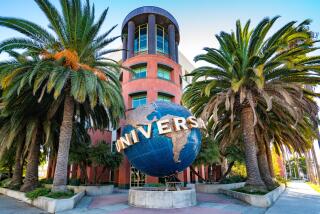AOL-BMG Deal Hinges on Payment
- Share via
Merger talks between the music divisions of AOL Time Warner Inc. and Bertelsmann have reached a crescendo and now hinge mainly on whether the German conglomerate is willing to chip in an estimated $100 million to close the deal, sources said.
The two sides have been creeping toward a pact to place their recorded-music units in a jointly owned operation that would rank as the world’s second-biggest record company behind Universal Music Group. But deal makers have bogged down in discussions about the valuations of the two units, which theoretically would be equal partners.
AOL, which has maintained that its Warner Music Group is the bigger of the two operations by several measures, told Bertelsmann that it must contribute the cash payment to balance out the venture, sources said. Bertelsmann, which owns music giant BMG, was expected to decide the issue as early as this week.
Prospects for a deal appeared to have dimmed after the two sides hadn’t cut a deal by Monday night when their exclusive negotiating agreement reportedly ended. But the two companies continued to negotiate and still could reach an accord within days, sources said.
“We still think we can do it,” said one insider.
The two companies have worked toward a deal since at least May. They nearly abandoned the effort after a separate dispute involving the sale of AOL’s book division chilled relations with Bertelsmann.
The return of the conglomerates to the bargaining table underscores the intensity of the music industry’s financial crisis. With the digital future unclear and with some CD prices falling, the record companies remain under pressure to squeeze profits from deep cost cuts and potential layoffs.
If successful, that strategy could breathe new life into both music companies at a time when the industry’s underlying economics are collapsing.
AOL’s Atlantic, Elektra and Burbank-based Warner Bros. Records release CDs by such acts as Missy Elliott, Jewel, Kid Rock and the Red Hot Chili Peppers. Linking up with BMG would provide access to artists on the RCA, Arista and Jive labels, including Justin Timberlake, the Dave Matthews Band, Outkast and Alicia Keys.
The joint venture would generate an estimated $6 billion in annual revenue and corner about 23% of worldwide market share. The two music giants have a combined workforce of about 10,000 employees. Sources say anticipated layoffs and the consolidation of their international operations -- and the expected reduction of their U.S. labels from six to four or three -- could yield hundreds of millions of dollars in annual cost savings.
Whether Bertelsmann will decide to pour cash into the venture remains to be seen. The privately held corporation, largely controlled by Germany’s powerful Mohn family, lately has had a rocky ride in the music business. Some analysts say the company may be looking to bail out or reduce its exposure to the industry’s flagging financial condition.
The German conglomerate was forced to pay about $2.7 billion last year to independent record label Zomba Music after the label’s owner, Clive Calder, exercised a contract option that BMG had agreed to several years earlier. Bertelsmann executives objected that the price tag -- calculated under a formula agreed to in advance -- far exceeded the label’s value in the declining industry.
Under music chief Rolf Schmidt-Holtz, installed in 2001, BMG pulled off a sharp financial turnaround last year, posting a profit after years of significant losses and political infighting under the previous management regime. But rampant piracy and other industry-wide woes continue to weigh on the division, which has reported a loss of about $127 million for the first six months of the year but projects a profit for the full year.
If the talks with Bertelsmann fall apart, sources said that AOL -- which tried unsuccessfully to join forces with music rival EMI Group in 2000 but rebuffed overtures from the company this year -- might consider selling all or a majority stake in the Warner Music operation to the British music heavyweight.
Representatives for Warner Music and BMG declined to comment.
More to Read
The biggest entertainment stories
Get our big stories about Hollywood, film, television, music, arts, culture and more right in your inbox as soon as they publish.
You may occasionally receive promotional content from the Los Angeles Times.










